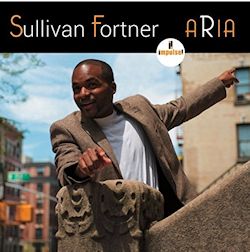-
Aria
-
Ballade
- Parade
-
I Mean You
-
You Are Special
-
All the Things You Are
-
You Know I Care
-
Passepied
-
For All We Know
-
Finale
Sullivan Fortner (piano): Tivon Pennicott (soprano, tenor saxophone): Aidan Carroll (bass): Joe Dyson (drums) [50:46]
Pianist Sullivan Fortner, experienced from service in the bands of Roy Hargrove, Etienne Charles and others, makes an auspicious debut here as leader in
his own right. His quartet includes a rising star of the saxophone, tenor and soprano player Tivon Pennicott, bassist Aidan Carroll and drummer Joe Dyson
Jr. The title track. Aria, and three other pieces come from a six-movement suite called Expansions. Iím using only a review copy and
promotional material so donít know if Fortner goes into any further detail about the suite and his aspirations for it in the booklet.
Aria
is an up-tempo opener, with a full quartet ensemble Ė this is no piano-leader vanity disc, there is real interdependency throughout Ė where Pennicottís
freewheeling soprano and Fortnerís articulate, busy pianism catch the ear. Ballade is another Fortner original, and itís graced by further
examples of the bandís tightness, from the light, fluent, tenor through the deep bass lines and crisp drum patterns. The taut angularity of the piano lines
in Parade reveal Fortnerís fondness for - and admiration of Ė Monk as does the funkier and more hard-hitting I Mean You though here the
roistering piano playing and strongly accented percussion patterns assert their own independence from the model.
You Are Special
, the Fred Rogers piece, is played as a richly sympathetic ballad whilst Parker and Gillespie are briefly referenced at the start of All The Things You Are before a Cedar Walton influence makes itself apparent. Itís good that the pacing of the album reflects Fortnerís fondness
for ballads. Duke Pearsonís You Know I Care and the slow, tender version of For All We Know, show how accomplished the quartet is at
exploring slower tempi without sounding at all mushy. In between Passepied, for all its baroque titling, is an up-tempo soprano work out. The
finale is called Ė wait for it Ė Finale and is a New Orleans drenched piece Ė Fortnerís home town Ė with plenty of free and easy (Big Easy indeed)
byplay.
This spirited album shows a confidence to vary tempi, texture, rhythm, and mood without allowing the programme to fragment. Thereís fire in up-tempo
numbers, clarity of expression in the ballads. Ensemble is tight and steady. Iím sure we wonít have too long to wait before the next Fortner disc.
Jonathan Woolf
